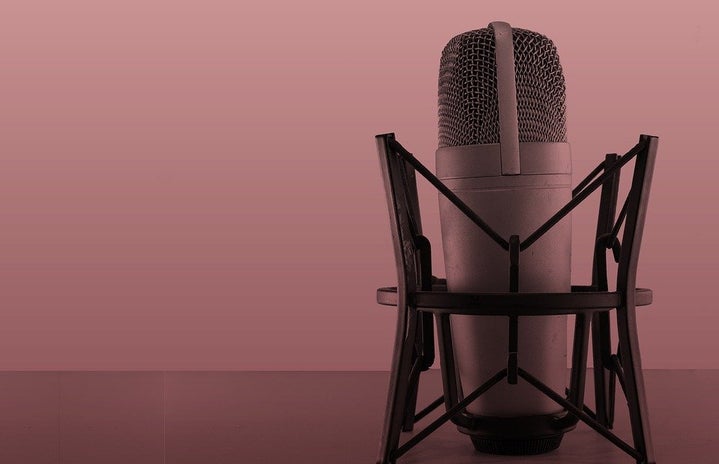“Call Her Daddy” Episode 100- MOTHER COOPER
I have always been a huge fan of the “Call Her Daddy” podcast hosted by Alexandra Cooper. On her show, she talks about relationships, sex and everything in between while making you laugh.
Every once in a while, she brings on special guests for an episode, and for the 100th episode of her podcast, she had a very special guest. This was none other than her mother, Laurie Cooper, who is a school psychologist. Fans of “Call Her Daddy,” a.k.a. Daddy Gang, had been waiting for this guest of honor for years now, and she did not let us down.
In this episode, Laurie gives insight to and background meaning of her “iconic lines” that she always tells Alex. These lines contain lessons that not only Daddy Gang should hear, but every young adult trying to navigate relationships should, too.
They can be so true that they hurt, but they are lessons that we need to hear to know our worth. These are six “iconic lines” that Alex and her Mother touch on in this episode.

“Unless you are engaging in a relationship where you truly believe that person makes you a better version of yourself, why would you ever commit to a static agreement?”
Every one of us should be with someone who makes us happy and allows us to continually grow as a person. It is solely your responsibility to better yourself, but if someone helps you with that, it is a healthy “agreement” or relationship. Your partner should bring out the best version of yourself and you should be a better person — mentally and physically — because of them.
However, if your partner puts you down, makes you feel worse about yourself or lets you think less of yourself, it is an unhealthy relationship that you should not be entertaining.
So, with every relationship you are in, you need to ask yourself: are you a better person in that relationship or out of it? The answer is usually very clear, even though it may be hard to accept.
“In an imbalanced relationship, the person that cares the least, controls the relationship.”
If one partner in a relationship always calls the shots and always makes the decisions, chances are they don’t care about the relationship as much. This becomes obvious when one partner is always responding to the beck and call of the other and repeatedly doing whatever they need, even if it is not reciprocated.
The lack of care can also show if this partner is not calling, texting, or holding a conversation within the relationship. This forces the other to constantly call, text and try to suck up to their partner to pick up their slack. This means only one partner puts in all the effort, and that is so unhealthy for both the over-benefitted and under-benefitted partner.
You also should not be in a relationship in which you feel you need to put in extra effort for your partner to really see you. If your partner truly cared about you and the relationship, they would automatically see you without you even trying.
In the podcast, Alex said, “Why do you want to be in a f*cking relationship with someone who doesn’t want to be in a relationship with you?” This can be a hard pill to swallow but it is true.
“You accept the love that you think you deserve.”
If you think you deserve a partner that does not treat you well, puts you down, and takes advantage of you in many different ways, then you will settle for that love and continue to be with that person. However, the second that you realize what you deserve, is when you will gain the strength to find someone new.
Even if the relationship is hard to leave or let go of, you will know you need to find a partner that will treat you and love you the way you deserve to be treated and loved.
“If something is bothering you in your relationships and if there are things that you do not like in your relationship, it will only get ten times worse when you get married.”
Some people believe their partner will get their act together once they tie the knot or have a child. This is not true and quite frankly it is the opposite. Problems within a relationship — whether it is substance abuse, loyalty problems, or imbalance issues — will not go away with a bigger commitment.
All problems within a relationship must be addressed, worked on and fixed or else they will persist in higher commitments than just dating. This means if you talk to your partner about something bothering you and they do not see it or have no intention of fixing it, they don’t care enough about the relationship nor would they want a further commitment. A partner must be willing to work with you to fix the relationship.
Self-awareness “is the single most important piece to develop for success in both your personal and your professional life.”
Being self-aware and in touch with who you are as a person is so important for so many reasons. It can help you react and respond positively to difficult situations. It will also help you to notice changes you need to make within yourself or your life.
Addressing these aspects that need changing is not easy, but once you begin changing them, you start to grow, evolve and better yourself. This growth is what improves your personal and professional life as you learn more about yourself, your wants and what you have to offer. Being more self-aware can help you find a better partner for you, and in return, be a better partner to them.
“So, what are you going to do about it? Cause you can’t change the way Susie made you feel, but you can change the way you’re going to behave and respond now to the situation. It’s the only control you have.”
You cannot control the way people or things make you feel. You can control the response you give that something or someone. Your reactions, or lack of one, is a way for you to protect yourself, and as Laurie said, “it’s the difference of what did they do to me or what am I going to do about it?”
Do not give other people the power to mess with your balance, and don’t make yourself dependent on the actions of others. This said action has already been done, so take a hold of the situation, control how it impacts your life, and control how you respond to it.
Decide what is actually worth your time and energy. Do not give something or someone a reaction if it doesn’t deserve one.
Along with these “iconic lines,” so many other amazing points are dropped within the episode and these are the ones that I think need to be shared too.
“NEVER settle.”
You get one life, so why would you settle for something that isn’t leading you to your highest potential? Find the relationship where you are the best version of yourself in, and DO NOT settle until you find it.
This means even if you think you’ve been in a relationship for too long or there is too much to lose in ending the relationship, don’t settle. Erase the thought from your mind that ending the relationship over something you aren’t happy with isn’t fair. It doesn’t matter how long you have been with your partner — if they aren’t making you happy anymore, find someone who does.
If you don’t, then you are settling, and it is something that you will regret later. You are never too old to find someone better for you.
If you have a partner that, “will not go to therapy with you… get out of it.”
If you voice a concern or address a problem within your relationship to your partner and they are not interested in fixing it, that is not healthy. Your partner should care about something troubling you and be willing to find solutions to fix it together. This could mean going to therapy over it or having a moderated talk with a mutual friend.
If your partner is not willing to do this or they think they do not need to change, they don’t care enough about the relationship to work on it with you. This is another hard pill to swallow.
“If you’re not good at confrontation, maybe you could text him while he’s at work.”
This is a huge takeaway for me, especially because I am someone who is not great at confrontation. To avoid bringing a problem up in person, you can drop the hint in a text simply by saying you want to talk about something later when your partner returns home.
Then, this puts the ball in your partner’s court to bring it up in person. You no longer have this pressure of starting the conversation, and that can make it easier for you to talk about what is bothering you and let out all your feelings/thoughts on the topic.
“You need to date to figure out what you want.”
Laurie said, there “is a process [to] figuring out what you like.” It is not something you learn overnight or through a single relationship. It is learned through the trial and error of multiple relationships, both romantic and friendly.
Men are often praised for “getting around,” not just meaning sex itself. They do this to figure out what they want, which is something all people looking for a serious relationship must do. It is unfair for women to be looked down upon when doing this same thing. You need to “get around” no matter what gender you are.
So, don’t ever let anyone put you down for getting yourself out there and figuring out what you want in a partner.
“It’s so important to know what you don’t want.”
Seeing what you want in another person is so easy, but there is another side of knowing what you DON’T want. When you know both of these aspects, you will start filtering out people that you should not settle for. A partner who understands the balance between your wants and don’t-wants will come.
The catch of knowing what you don’t want in a partner is the negative experiences you must go through to figure them out. They may have been difficult and unenjoyable, but you learned and grew from it, which leads to the next point.
“Don’t ever regret a negative experience if you grew from it.”
Negative experiences are anything that knocked you down. They include, but are not limited to, breakups, cheating partners, horrible dates, or mistakes. However, if you were able to stand up again, learn from the experiences, and move on, then you grew from it.
Because of those not-so-good experiences, you have a better sense of self that you can build on in the future. Never regret something that made you stronger.
“Who is super toxic in my life? And why do I still entertain those people?”
Sometimes we need to reevaluate who is in our lives and how they make us feel. Do they only reach out when they need something? Do they make us feel bad about ourselves? Are they there for you when you need them? Do they give you anything in return? Do they exhaust you?
These questions need to be asked about each person in your life because they show what a partner or friend contributes to you or takes from you. It can be difficult to accept the exhaustion a person causes you but sometimes it is more difficult to cut these people off. If someone is toxic to your mental health, leave the situation even if it requires professional help. You need to decide who to give your time to and who will return it.
“You are going to spend the rest of your life trying to help this man get healthy… and sometimes people do that because they think, ‘I love them.’ You better look at your construct of what love is.”
Yes, love is about being there for someone and helping them through tough times. But, if you’re always doing that for them, you won’t ever escape it.
This is especially true if your partner depends on you for emotional support. You can’t and do not need to save this person. If you think you can save someone or change someone because you love them, you need to redefine what you think love is. Love is not all about helping.
Relationships must be a give and take. As Laurie said in the podcast, “It has to be a partnership. It doesn’t have to be equal with exactly the same stuff, but it has to balance out always as an equal partnership.”
If it doesn’t balance out and you are always giving your time, it can drain you to the point of losing yourself. If you lose yourself in a relationship, it is not bringing out the best version of yourself and it is not a healthy relationship to be in.
All of these sayings and important lessons Laurie and Alex Cooper talked about can help you change the way you look at relationships. Every person should hear this episode in order to find a partner to have a successful relationship with that brings out the best version of themselves, not one that they settled for.
“Call Her Daddy” Episode 100- MOTHER COOPER



